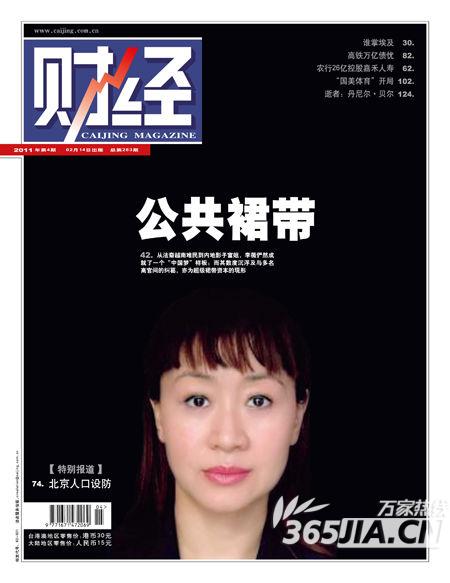If anyone had doubts about the future health of Caijing magazine as a place for harder-hitting journalism after the departure of founding editor-in-chief Hu Shuli (胡舒立) in November 2009, the magazine’s latest issue is cause for optimism, if not applause.
Archived report available here:
Report 1
Report 2
Report 3
Report 4
Report 5
A new investigative report in Caijing from journalist Luo Changping (罗昌平), known for his recent book about the 2003 Chenzhou corruption scandal, uncovers how the corruption cases against a number of prominent officials in recent years, including former Qingdao party secretary Du Shicheng (杜世成) and former Sinopec CEO Chen Tonghai (陈同海), all have a shadow figure in common — a former Vietnamese refugee named Li Wei (李薇).
The Caijing report alleges that Li Wei (李薇) used her relationship with her husband, a former tobacco official, to get close to top officials in Yunnan, Guangdong, Beijing and Qingdao, creating a vast network of protection and favor that she used to personally enrich herself.
The report’s title, “The Public Band”, or gonggong qundai (公共裙带)), references the intersection of money and power, or “crony capitalism,” which in Chinese can be literally translated “skirt-band capitalism,” or qundai ziben zhuyi (裙带资本主义).
According to the article, many high-level officials now being held in Beijing’s Qincheng Prison — including former Yunnan governor Li Jiating (李嘉廷), former Beijing deputy mayor Liu Zhihua (刘志华), former deputy judge of the Supreme People’s Court Huang Songyou (黄松有), and former deputy chief of the China Development Bank Wang Yi (王益) — all had previous dealings with Li Wei’s network of power and money.
The report also mentions, withholding names, two high-level state officials who previously supported Li Wei. As a matter of general practice in China’s media, the withholding of the names of “high-level officials” in news reports indicates those concerned are officials at the most senior levels.
Many of the corruption cases crossing through this Caijing report stretch back years. The Li Zhihua corruption case, for example, hit headlines in China well ahead of the Beijing Olympic Games in 2008, and was handled with great care in the state media, given that Li was responsible for the construction of Olympic sites in the capital.
We’re just poring through this report now, but we commend it to readers of Chinese. As there are signs of a tightening climate for domestic media in China — and particularly as investigative reporting has grown more difficult in recent years — the appearance of a report of this nature is highly significant.

[The cover of the most recent edition of Caijing magazine, with an image of the mysterious Li Wei].




















